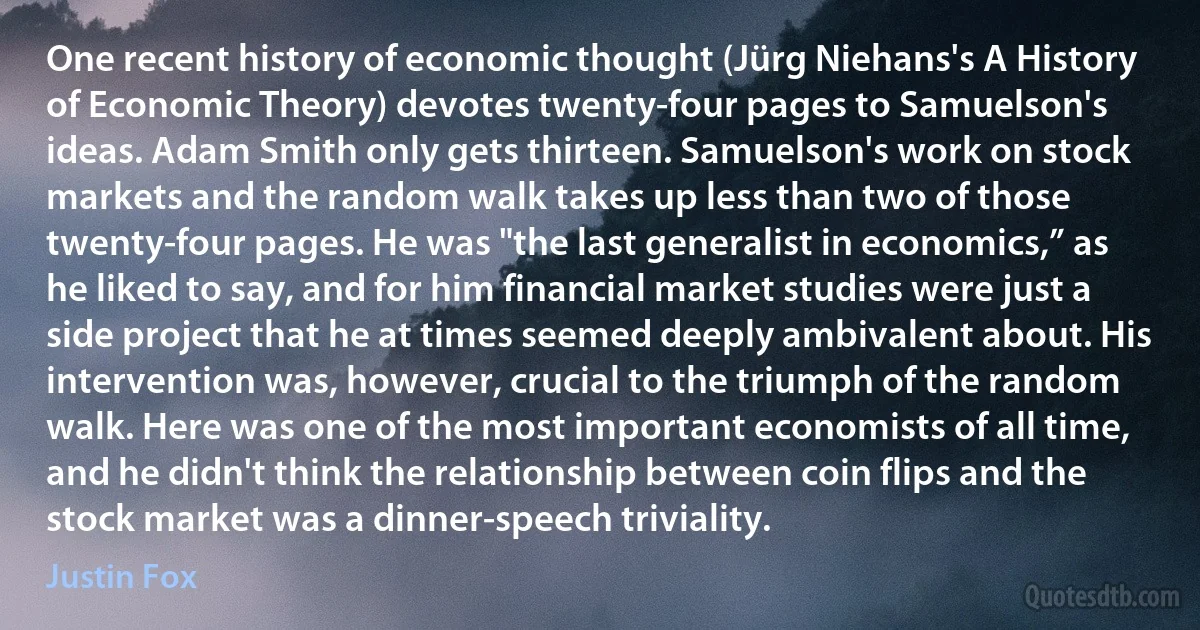
One recent history of economic thought (Jürg Niehans's A History of Economic Theory) devotes twenty-four pages to Samuelson's ideas. Adam Smith only gets thirteen. Samuelson's work on stock markets and the random walk takes up less than two of those twenty-four pages. He was "the last generalist in economics,” as he liked to say, and for him financial market studies were just a side project that he at times seemed deeply ambivalent about. His intervention was, however, crucial to the triumph of the random walk. Here was one of the most important economists of all time, and he didn't think the relationship between coin flips and the stock market was a dinner-speech triviality.
Justin FoxRelated topics
adam coin economics history intervention last less market project say side thought think times time triviality walk workRelated quotes
Even when altruism is allowed (as, for example, in Gary Becker's model of rational allocation), it is assumed that the altruistic actions are undertaken because they promote each person's own interests; there are personal gains to the altruist's own welfare, thanks to sympathy for others. No role is given to any sense of commitment about behaving well or to pursuing some selfless objective. All this leaves out, on the one hand, the evil passions that early theorists of capitalism contrasted with self-interest and, on the other, the social commitments that Kant analyzed in The Critique of Practical Reason and that Adam Smith discussed in The Theory of Moral Sentiments.

Amartya Sen
The very name of my subject, economics, suggests economizing or maximizing. But Political Economy has gone a long way beyond home economics. Indeed, it is only in the last third of the century, within my own lifetime as a scholar, that economic theory has had many pretensions to being itself useful to the practical businessman or bureaucrat. I seem to recall that a great economist of the last generation, A. C. Pigou of Cambridge University, once asked the rhetorical question, "Who would ever think of employing an economist to run a brewery?” Well, today, under the guise of operational research and managerial economics, the fanciest of our economic tools are being utilized in enterprises both public and private.

Paul Samuelson
Market power and externalities are examples of a general phenomenon called market failure-the inability of some unregulated markets to allocate resources efficiently. When markets fail, public policy can potentially remedy the problem and increase economic efficiency. Microeconomists devote much effort to studying when market failure is likely and what sorts of policies are best at correcting market failures. As you continue your study of economics, you will see that the tools of welfare economics developed here are readily adapted to that endeavor. Despite the possibility of market failure, the invisible hand of the marketplace is extraordinarily important.

Greg Mankiw
[S]cientists are not robotic inducing machines that infer structures of explanation only from regularities observed in natural phenomena (assuming, as I doubt, that such a style of reasoning could ever achieve success in principle). Scientists are human beings, immersed in culture, and struggling with all the curious tools of inference that mind permits [...]. Culture can potentiate as well as constrain-as Darwin's translation of Adam Smith's laissez-faire economic models into biology as the theory of natural selection. In any case, objective minds do not exist outside culture, so we must make the best of our ineluctable embedding.

Stephen Jay Gould
Will the tax cut destroy America's prosperity? Probably not. As Adam Smith observed, there's a deal of ruin in a nation. We have a huge, resilient economy that can survive and recover from even quite bad government policies.
Yet while the tax cut may not be a matter of economic life or death, it is a very serious issue. For one thing, like it or not, the tax cut has become the central political issue in the United States right now. Conservatives who want to reshape America view passage of a large tax cut as a first step toward realizing their vision. For that reason, those who do not share this vision feel, rightly, that they must oppose the plan.

Paul Krugman
